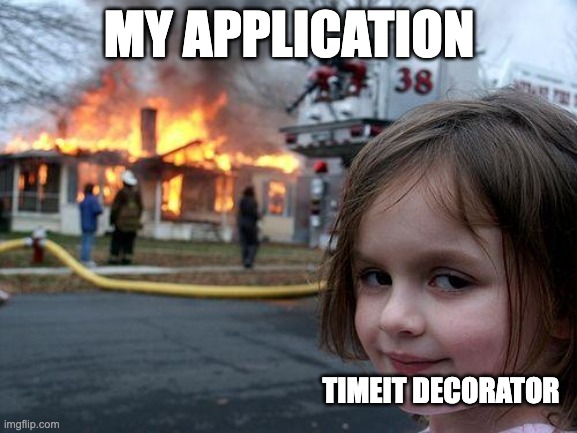TL;DR: Always use
functools.wrapsfor your decorators.
Decorators in python are wonderful. They let you modify or extend the behavior of functions or methods without permanently modifying their source code. I’ve used them in several places in my code to add features to my functions. But recently, I came across a weird, or rather interesting, bug that I felt was worth sharing.
The Issue
So we had a Flask API that was responsible for ML inference. Here is what the rough structure of the project looked like:
project/
├── app/
│ ├── utils/
│ ├── __init.py__
│ ├── decorators.py
| ├── __init.py__
│ ├── app.py
│ ├── ...
app/app.py
# all other imports
....
from utils.decorators import timeit
@app.route('/v1/predict/', methods=['POST'])
@timeit
def predict_v1(...):
# do something
So as you can see above, we had a fairly simple decorator for timing the execution of an endpoint. Here is what a rough implementation of the decorator looked like:
app/decorators.py
import time
def timeit(func):
def wrapper(*args, **kwargs):
start_time = time.time()
result = func(*args, **kwargs)
end_time = time.time()
elapsed_time = end_time - start_time
print(f"Function '{func.__name__}' executed in {elapsed_time:.4f} seconds")
return result
return wrapper
For those Python wizards out there who can immediately identify the issue by seeing the snippets above, feel free to skip the rest of this article (you guys have my respect). For those who didn’t spot the issue from the snippets above, don’t worry—you’re in the right place! Let’s walk through it together so you can understand the problem.
This application was working fine for a long time until I decided to modify some pre-processing logic in the ML inference. I did not directly update the current endpoint as the changes were not quite backward compatible. So I created a /v2/ endpoint for the new changes. My application now looked something like this:
app/app.py
# all other imports
....
from utils.decorators import timeit
@app.route('/v1/predict/', methods=['POST'])
@timeit
def predict_v1(...):
# do something
@app.route('/v2/predict/', methods=['POST'])
@timeit
def predict_v2(...):
# do something, but differently ;)
Everything looked good, I had tested the new logic in isolation, and it was working exactly how I needed it to. So, with full confidence I started my flask server with flask run and the server instantly crashed.
Puzzled as to why this happened, I checked the logs. There, I saw a new error message. It wasn’t the typical kind of message I was used to seeing at my job:
AssertionError: View function mapping is overwriting an existing endpoint function: wrapper

Understanding the Issue
Ok let’s break the error message.
The first part of the message AssertionError: View function mapping is overwriting an existing endpoint function indicates that something went wrong in the Flask server regarding the route definitions. This message basically says that there are two routes with the same function name which is not allowed in Flask. You can refer to this article to understand more about Flask routes.
But how did this happen? I had explicitly named the functions predict_v1 and predict_v2. Why was this assertion error raised?
Ahh, the error message points to the culprit too: the function name wrapper.
After spending some time, I figured out what had happened: When we applied the timeit decorator to our functions, the decorator returned a new function named wrapper. This meant that both of our route functions predict_v1 and predict_v2, were being replaced by a single function named wrapper. Flask uses the function name as the endpoint name by default. Since both decorated functions were now named wrapper, Flask tried to register multiple route functions with the same name, causing the AssertionError.
The Solution
After understanding the issue, my immediate intuitive solution was to explicitly rename the wrapper function to the original function name inside the decorator before returning it.
app/decorators.py
import time
def timeit(func):
def wrapper(*args, **kwargs):
start_time = time.time()
result = func(*args, **kwargs)
end_time = time.time()
elapsed_time = end_time - start_time
print(f"Function '{func.__name__}' executed in {elapsed_time:.4f} seconds")
return result
wrapper.__name__ = func.__name__ # rename the function name before returning
return wrapper
And to my surprise, this worked! (Ah, that feeling you get when your code works on the first try). But I wasn’t satisfied with this solution. I wanted to understand it more. How could such a thing even exist? I am surely not the first programmer who has used decorators on their Flask routes. How could such an issue arise? I have been using decorators for over a couple of years, but why did this never occur to me? I was at the office, so I called my colleague Ashish to tell him about my newfound issue. Me being me, I just showed him the original decorator and asked him what’s wrong here. He took some time, carefully read each and every line, and answered, “There’s no functools.wraps in that decorator.”
How did I not see that? I have been using functools.wraps to create decorators, but really without understanding the why aspect of it. So, again I modified my decorator with functools.wraps and removed the function renaming part:
app/decorators.py
import time
from functools import wraps
def timeit(func):
@wraps(func)
def wrapper(*args, **kwargs):
start_time = time.time()
result = func(*args, **kwargs)
end_time = time.time()
elapsed_time = end_time - start_time
print(f"Function '{func.__name__}' executed in {elapsed_time:.4f} seconds")
return result
return wrapper
My Flask application did not crash this time!
Now I wanted to understand what exactly does functools.wraps do.

Understanding functools.wraps
Being the unsensible person I am, instead of searching the documentation of functools.wraps, I directly opened the source code of it.
def wraps(wrapped,
assigned = WRAPPER_ASSIGNMENTS,
updated = WRAPPER_UPDATES):
"""Decorator factory to apply update_wrapper() to a wrapper function
Returns a decorator that invokes update_wrapper() with the decorated
function as the wrapper argument and the arguments to wraps() as the
remaining arguments. Default arguments are as for update_wrapper().
This is a convenience function to simplify applying partial() to
update_wrapper().
"""
return partial(update_wrapper, wrapped=wrapped,
assigned=assigned, updated=updated)
It returns a partial of the function update_wrapper. There was nothing I could make out of this function alone. So I moved to the implementation of update_wrapper. This is where things got interesting.
WRAPPER_ASSIGNMENTS = ('__module__', '__name__', '__qualname__', '__doc__',
'__annotations__', '__type_params__')
WRAPPER_UPDATES = ('__dict__',)
def update_wrapper(wrapper,
wrapped,
assigned = WRAPPER_ASSIGNMENTS,
updated = WRAPPER_UPDATES):
"""Update a wrapper function to look like the wrapped function
wrapper is the function to be updated
wrapped is the original function
assigned is a tuple naming the attributes assigned directly
from the wrapped function to the wrapper function (defaults to
functools.WRAPPER_ASSIGNMENTS)
updated is a tuple naming the attributes of the wrapper that
are updated with the corresponding attribute from the wrapped
function (defaults to functools.WRAPPER_UPDATES)
"""
for attr in assigned:
try:
value = getattr(wrapped, attr)
except AttributeError:
pass
else:
setattr(wrapper, attr, value)
for attr in updated:
getattr(wrapper, attr).update(getattr(wrapped, attr, {}))
# Issue #17482: set __wrapped__ last so we don't inadvertently copy it
# from the wrapped function when updating __dict__
wrapper.__wrapped__ = wrapped
# Return the wrapper so this can be used as a decorator via partial()
return wrapper
update_wrapperupdates a wrapper function to look like the wrapped function.- It copies the
__module__,__name__,__qualname__,__doc__, and__annotations__attributes from the wrapped function to the wrapper function. This default list is defined inWRAPPER_ASSIGNMENTS. - It updates the
__dict__of the wrapper with all elements from the wrapped function’s__dict__, based onWRAPPER_UPDATES. - It sets a new
__wrapped__attribute on the wrapper, pointing to the original function.
In a nutshell, functools.wrap ensures that the decorated function retains the original function’s signature, documentation, and other attributes. (So bascially an extented version of my intial solution 😅).
In conclusion, encountering issues like this serves as a valuable reminder of the subtle complexities and hidden layers that lie beneath the surface of programming. It shows that no matter how much we learn, there’s always more to discover! Keep learning, cheers 🥂.